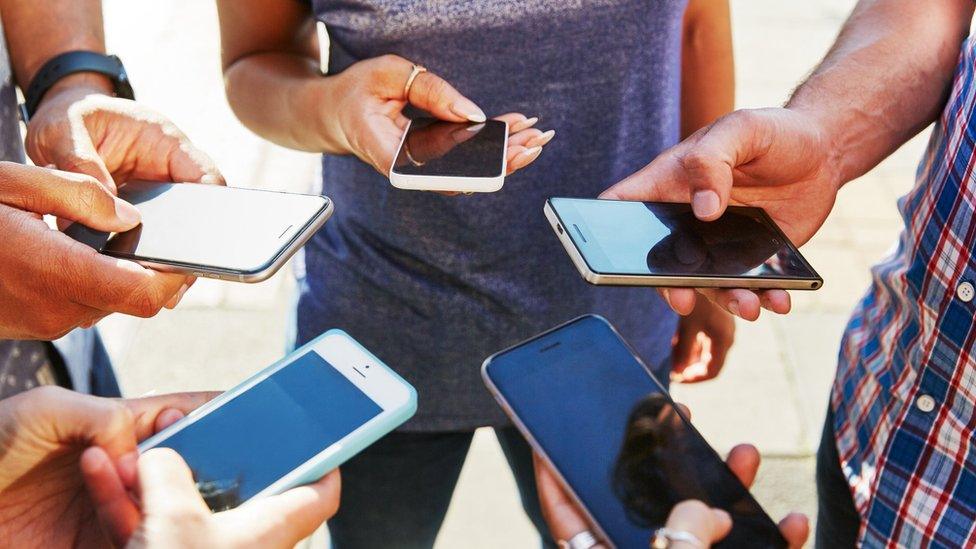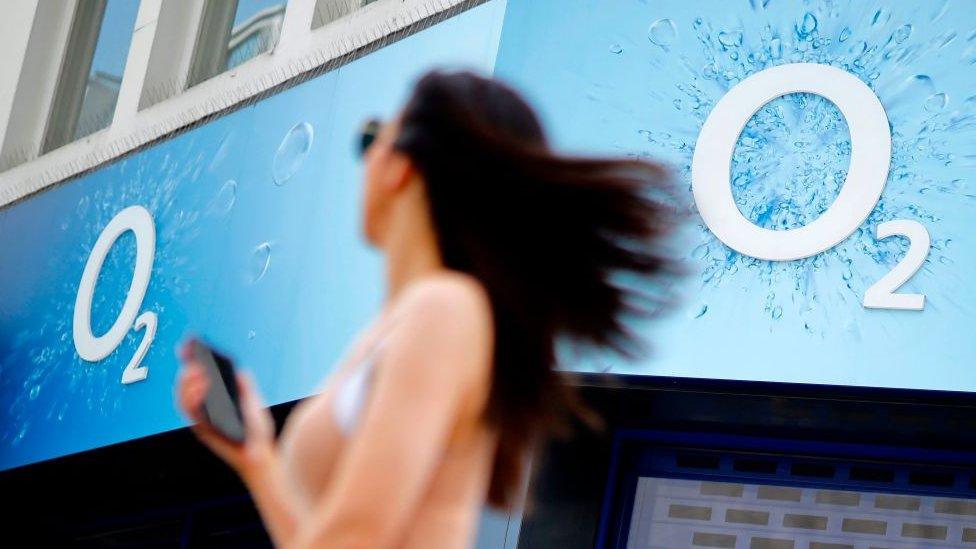Phone firms row over whether customers are overpaying
- Published

Virgin Media O2 has accused rival mobile operators of not doing enough to help customers move onto cheaper monthly tariffs.
The phone giant says other firms are "swindling" people by keeping them on rates that cover the cost of a handset, even after they have finished paying for the phone.
The accusation has prompted a row with other firms including EE and Vodafone.
They say Virgin Media O2's claims are misleading and confusing.
Most mobile customers sign a deal to pay a fixed monthly amount which includes airtime, usage and a payment towards the cost of the phone itself.
However, once the initial contract has ended, the customer owns the phone and can switch to a cheaper deal to cover calls, text and data only.
Virgin Media O2 says a survey conducted on its behalf, which spoke to more than 5,000 adults in the UK, found 3.9% of all UK mobile customers were still on contracts with EE, Vodafone and Three that have been rolled over beyond their initial time plan.
The company claims each year £530m is being paid by customers on those networks for handsets they already own.
It says that although all operators have improved their communication with customers to let them know they are falling out of contract, it thinks all providers should ensure customers do not keep paying the higher price once they have bought the phone.
Virgin Media O2 says split deals, which automatically reduce when the phone is paid for, now account for more than 95% of its own contracts.

O2 introduced split contracts a decade ago
But its rivals hit back, saying that they also offered such deals.
EE owner BT called Virgin Media O2's claims "misleading" and said it already offers a contract called Flexpay which automatically reduces once people have paid for their handset.
"Like Virgin Media O2 we offer split contracts with EE Flexpay, while providing all customers with clear end-of-contract notifications, including the best offer for them based on their usage," it said.
Vodafone said it was disappointed to see Virgin Media O2 "confusing consumers with incorrect information".
"Like Virgin Media O2, Vodafone customers on split contracts with Vodafone EVO will not see any further handset charges once their 0% finance deal ends and will therefore never overpay for a phone. All handset customers on legacy contracts are contacted repeatedly when their contract comes to an end, and after three months - if they haven't moved onto a new contract already - we automatically apply a monthly £5 discount."
A Three spokesperson said: "Three already offers split contracts where customers can take out a loan to pay for their device, which is separate to their monthly airtime payments. The customer owns their device from when they purchase it and once their device loan is paid off, the customer isn't required to make any further payments towards the cost of their device."

How to check if your phone is out of contract
Since February 2019 providers must contact customers via letter, email or text message to warn them their contract is about to end.
They don't have to tell you the cheapest deal available to switch onto though, so it's worth contacting your provider or shopping around to get the cheapest deal.
If you're not sure when your contract runs out you can text the word INFO to 85075 at any point. Within minutes you should receive a reply letting you know when your contract expires and what any early termination charges will be.

Kester Mann, telecoms analyst at research firm CCS Insight, said Virgin Media O2 was right to highlight the "archaic practice" of charging customers for phones they have already paid for.
"They're right to kick up a fuss over this. These customers that are paying for handsets after contracts end are very lucrative for operators, which is why perhaps they've been so slow to move," he said.
O2 had introduced split contracts a decade ago, Mr Mann added, which is why they were ahead of rivals in this area.
Since the cost of living crisis, customers are more likely to stay on the same phone deal for longer, rather than upgrade to a more expensive deal, and so are more likely to fall out of contract and end up overpaying.
According to Money Saving Expert, external, there are 14 million customers currently out of contract.
Research by Which? in October 2020 suggested that 13% of customers are unlikely to do anything when contacted by a supplier about the end of their contract, putting them at risk of overpaying, with older people and those on the lowest incomes disproportionately affected.
Rocio Concha, director of policy and advocacy at Which?, said the cost of living crisis had thrown a spotlight on unfair practices in the telecoms industry, including overcharging and mid-contract price hikes.
"We would encourage anyone who is out of contract to shop around immediately for a better deal. If you've paid off your handset, it's particularly worth looking at cheap Sim-only plans - which can cost as little as £5 per month," she said.
The row comes at a time when all mobile and broadband providers are under pressure to do more to reduce costs and provide more options for lower income customers.
Many providers hiked bills at the start of April by as much as 17.3%, as they are allowed to increase contract prices by the rate of inflation plus around 4%.
The regulator Ofcom is currently investigating this issue but is unlikely to change anything for customers in the coming months.
Additional reporting by Lucy Hooker

Are you on a mobile phone contract that has been rolled over beyond the initial time plan? Share your experiences by emailing haveyoursay@bbc.co.uk, external.
Please include a contact number if you are willing to speak to a BBC journalist. You can also get in touch in the following ways:
WhatsApp: +44 7756 165803
Tweet: @BBC_HaveYourSay, external
Please read our terms & conditions and privacy policy
If you are reading this page and can't see the form you will need to visit the mobile version of the BBC website to submit your question or comment or you can email us at HaveYourSay@bbc.co.uk, external. Please include your name, age and location with any submission.
Related topics
- Published9 February 2023
